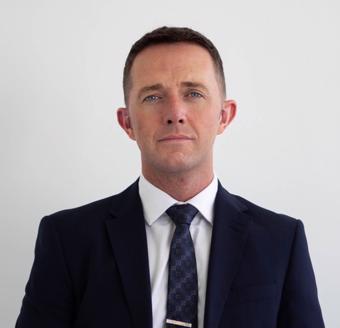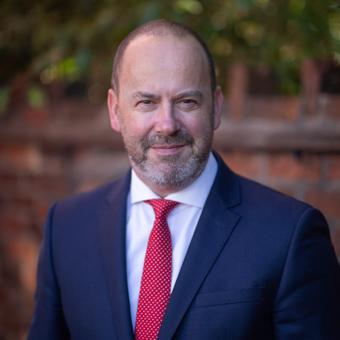Jeanette Burgess is the new managing partner at Walker Morris, and the first woman to hold the position in the Leeds firm’s long history. She tells The Brief about her regulatory practice, her priorities for the firm, and her passion for encouraging social mobility.
Jeanette Burgess took over as managing partner of Leeds-based Walker Morris in May 2024, becoming the first woman to hold the role in a history that stretches back to the 19th Century.
Burgess, who practices in the field of regulatory compliance, joined Walker Morris in 2006 as a director to set up and lead the firm’s regulatory team, and made partner the following year. She has been on the firm’s board since 2015.
Early career
Brought up in a “solid working class family in South Yorkshire”, Burgess says she had great support from her parents, whose example helped drive her enthusiasm for learning and instilled in her a strong work ethic. She was also, she says, “fortunate to receive a great education at a local comprehensive school with some truly inspiring teachers” and was the first person in her family to go to university.
She was accepted to read law at Oxford in 1990 and then went on to law school in Chester before training with Dibb Lupton Broomhead (now DLA) in Manchester. Upon qualification in 1996 she joined the firm’s regulatory services team, where she spent several years, including a period on secondment to the Financial Services Authority.
In 2003, shortly after the birth of her first son, Burgess moved back to Yorkshire and took an in-house role with a financial services business in Bradford. “This move delivered in-depth experience in financial services and consumer credit, which has been the mainstay of my practice ever since,” she tells The Brief.
However, after three years in-house she realised her “true calling was in private practice”, interviewed for Walker Morris and “felt an immediate affinity with the firm and the people.”
Regulatory practice
The regulatory practice established by Burgess in 2006 has grown from herself and a trainee in the beginning to a 16-strong team, including three other partners.
She still engages in fee earning work, though she has had to step back from full-time practice since being elected managing partner. “Fortunately”, she says, “the growth of the regulatory team has delivered the necessary talent and strength in depth to ensure that optimum client service levels are maintained.”
The regulatory landscape is, she says, constantly evolving and impacted by global factors such as technology, political change, and ESG initiatives.
“The ever-increasing volume and scope of regulation, often attracting criminal sanctions, presents significant risks and challenges for businesses,” she says. “Staying informed and proactive is vital to stay ahead of the curve.
“My practice has reflected these changes over the years with issues like data protection and cybersecurity becoming increasingly important for clients.
Compliance is not merely a legal obligation, it's business-critical and this has been reflected in the growth in standalone regulatory and compliance teams within many businesses.
As the pace of technology changes accelerates, she continues, the regulatory framework can struggle to keep up, leading to complexity and potential confusion for clients. An example of this is artificial intelligence.
“The UK government has been opposed to specific regulation of AI, preferring to devolve responsibility to existing regulators,” she explains. “The government believes that it’s too early to legislate, and AI use must be examined in context.
“Europe has taken a more proactive approach, delivering complication for cross border clients. This is a key area that will continue to change as the tech landscape advances.”
Election as managing partner
Election as managing partner at Walker Morris is subject to a full partner vote. Managing partners are elected for a three-year term, and can serve a maximum of two terms.
Burgess was elected unopposed in February 2024, and took over from her predecessor, Malcolm Simpson, in May.
“I am very lucky to have inherited a firm that is in great shape, having grown revenue by 68 per cent over the last six years, from £44 million to £74 million, while simultaneously reducing staff turnover and enhancing benefits at all levels,” she says.
My primary objective as managing partner is to implement our three-year strategic growth plan, Ambition 27, by building on the strong foundation we’ve collectively established to deliver greater success.
"My focus is on evolution rather than revolution, capitalising on our existing strengths and making targeted investments to deliver sustainable and profitable growth.”
It is, she continues, “equally important that we maintain our distinctive collegiate and supportive culture as we grow and ensure we don’t dilute the qualities that define us, and which make Walker Morris a great place to work.”
The firm’s Ambition 27 three-year growth strategy rests on three key pillars: investment in people, in the firm’s client base and in innovation.
Burgess says, “Our success hinges on our people. To expand and enhance our skills base we must retain, attract, and develop the best talent, both lawyers and business services professionals.”
Another key priority for the firm is to invest in client services, including growing practice areas such as infrastructure & energy and tech & digital. It has also launched its “Illuminate” offering for GCs and in-house counsel which, Burgess says, focuses on their key areas of concern including regulatory change, risk management, embedding ESR goals and managing the threat of cyber-attacks.
Explaining the third pillar of the three-year growth strategy, innovation, she says, “Given the accelerating pace of technological change, it's essential that we invest in innovation. By safely maximising opportunities presented by emerging technologies, such as cloud computing and generative AI, and leveraging our valuable data, we aim to achieve greater efficiencies as a firm.”
Social mobility
Although the legal sector is currently engaged in working out how best to adapt to, and implement, AI, it faces another, far older, challenge, which is particularly close to Burgess’s heart. “I’m passionate about improving social mobility and promoting wider diversity and inclusion in the sector,” she says.
There are still many barriers to entry for people looking to enter the profession, including the cost of education, access to networking opportunities and discrimination and bias. Progress is being made, but we still have some way to go.
To address this, Walker Morris has partnered with Bishop Young High School in Seacroft, Leeds, to help students explore potential career paths, including opportunities for a career in law and alternative routes into the profession, such as apprenticeships.
It is also one of 16 law firms involved in the Breaking Down Barriers to Law project. The project examines how meaningful change can be achieved across the profession and includes workshops focusing on outreach, access, recruitment, and progression.
Burgess continues, “Many of our lawyers, including 70 per cent of our partners, attended state schools, and we want to actively encourage the next generation by evidencing that those with drive and determination can succeed, whatever their background.
“We’ve already taken steps to improve D&I within the firm but recognise this is an ongoing journey, not a destination. We have additional goals to enhance our efforts over the next 12 months and beyond.
“These include introducing blind recruitment across all roles and using specialised diversity job boards for recruitment. We're committed to continuously exploring ways to improve our approach to equality, inclusion and diversity.”
Advice for aspiring lawyers
Whatever their background, Burgess says aspiring lawyers who wish to succeed should be themselves, actively seek out opportunities and work hard to achieve their goals. “Confront challenges boldly and don’t be disheartened or intimidated by failure – it's an inevitable part of life and the best way to learn,” she says.
She also points out that law is a service industry, and that managing client relationships effectively requires positive and responsive communication. “Always go the extra mile to deliver and speak to your clients regularly rather than relying exclusively on email,” she continues.
Support networks are also vital: “A career in law is a marathon, not a sprint, so seek to develop strategies that work for you to help build the necessary resilience to support a sustainable and enjoyable career and effectively balance work, family and a social life.
Value your support systems and actively seek mentors who can guide and push you towards your potential. And never be afraid to ask for help when you need it.
“Remember that the senior people with whom you work were once at the same stage as you and will have experienced the same uncertainties and worries – we are all human,” she concludes.
Visit
Connect with Jeanette Burgess via LinkedIn









